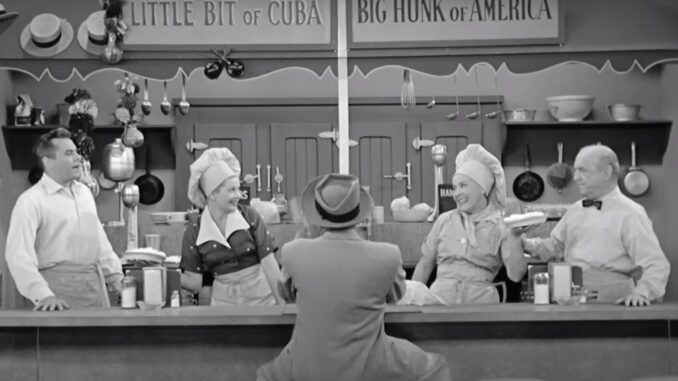
Few shows have left as lasting an impact as I Love Lucy, a groundbreaking sitcom that redefined television in the 1950s. Lucille Ball and Desi Arnaz captured the hearts of audiences worldwide with their comedic timing, unforgettable storylines, and heartwarming portrayal of married life. But despite its immense popularity, I Love Lucy ended in an unusual way—without a proper finale. Why did such an iconic show come to such an abrupt close? Dive into the real reasons behind the sudden end of I Love Lucy and explore the factors that led to its unexpected conclusion.
The Legacy of ‘I Love Lucy’
Setting the Stage for Sitcom Success
When I Love Lucy debuted in 1951, it didn’t just entertain; it revolutionized television. Lucille Ball’s impeccable comedic talents, combined with Desi Arnaz’s innovative production techniques, changed the landscape of television sitcoms. The show was the first to use a multi-camera setup and live audience, a method still common in sitcoms today.
Why Fans Were Shocked by the Sudden Ending
As one of the most-watched and adored sitcoms of its time, fans naturally expected a satisfying end to Lucy and Ricky Ricardo’s story. But instead of a heartfelt farewell, I Love Lucy simply ended. The lack of closure left fans wondering why such a beloved show would vanish without a proper goodbye.
Behind the Scenes of ‘I Love Lucy’s’ Abrupt Ending
The Strain of Real-Life Marital Issues
One of the major factors behind the show’s abrupt end was the off-screen relationship between Lucille Ball and Desi Arnaz. Although they had undeniable chemistry on screen, their marriage was fraught with tension. The demanding schedule of filming I Love Lucy only exacerbated the strain. By 1957, the couple’s personal issues had become overwhelming, leading them to separate their personal lives from their professional partnership.

The Transition from Sitcom to Hour-Long Specials
In the later years, I Love Lucy took a different approach by transitioning to hour-long specials under the title The Lucille Ball-Desi Arnaz Show. This change was a middle ground to keep the characters alive without the weekly demands of a sitcom. However, these specials were sporadic and lacked the cohesive storytelling that fans expected.
Burnout and Exhaustion for the Cast and Crew
Creating a hit show comes with its own pressures. Lucille Ball and Desi Arnaz, who were both starring in and producing the show, were under immense stress to maintain its quality. The intense workload contributed to the eventual burnout of both the cast and the crew, leading to the decision to bring the weekly format to an end.
Was ‘I Love Lucy’ Meant to Have a Final Episode?
No Plans for a Grand Finale
Unlike today’s carefully planned series finales, shows in the 1950s didn’t typically receive a ceremonious ending. The concept of a “finale” wasn’t a standard practice at the time. Therefore, while fans might have hoped for a conclusive goodbye, the lack of a proper ending wasn’t entirely uncommon.
Evolving Media Standards for Show Endings
Television was still in its early stages, and writers weren’t as focused on giving a show a defined endpoint. Unlike modern sitcoms that often build up to a memorable last episode, shows in the 1950s were more focused on each episode standing on its own. The shift in media expectations didn’t fully occur until decades later.
Lucille Ball’s New Beginnings: Life After ‘I Love Lucy’
The Launch of ‘The Lucy-Desi Comedy Hour’
Following the end of I Love Lucy, Lucille Ball and Desi Arnaz continued with The Lucy-Desi Comedy Hour. Although it didn’t have the same episodic charm, it allowed fans to reconnect with their favorite characters and gave Lucy and Desi a platform to continue their legacy in a new format.
Lucille Ball’s Career Beyond Ricky Ricardo
After their marriage dissolved, Lucille Ball went on to lead other successful shows, including The Lucy Show and Here’s Lucy. She solidified her status as a television icon, proving that her talent extended far beyond the role of Lucy Ricardo.
Audience Reaction to the Abrupt Ending
The Shock and Disappointment of Fans
For viewers who had followed Lucy and Ricky’s adventures for six years, the abrupt ending felt like an unexpected loss. Many fans wanted closure and felt that the show’s characters deserved a proper send-off.
Why Audiences Felt Attached to ‘I Love Lucy’
I Love Lucy wasn’t just a show; it was a source of joy, humor, and relatability. Audiences had formed a deep emotional connection with Lucy and Ricky, making the sudden end feel like losing friends.
Cultural Impact of the Sudden End of ‘I Love Lucy’
How the Show’s Ending Influenced Television
Despite its unexpected end, I Love Lucy continued to impact television. It demonstrated the power of a female lead, the importance of character-driven storytelling, and the potential of multi-camera sitcoms.
The Series’ Long-Lasting Legacy
Decades later, I Love Lucy remains a beloved classic. Its reruns continue to entertain new generations, and its abrupt ending has become part of its mystique. Fans still discuss why it ended so suddenly and how it might have concluded in today’s era.
Could ‘I Love Lucy’ Have Had a Different Ending?
Speculation on a Possible Finale
If I Love Lucy had been given a finale, what would it have looked like? Some fans imagine a heartfelt conclusion where Lucy and Ricky embark on new adventures. Others believe that Lucy would have continued her hilarious antics in a satisfying wrap-up episode.
How Modern Viewers Interpret the Ending
With today’s standards for television finales, audiences often revisit I Love Lucy’s abrupt end and wonder if it missed an opportunity. This speculation adds to the enduring intrigue surrounding the show’s legacy.
Conclusion
While I Love Lucy ended without a proper finale, its impact on television remains timeless. The off-screen struggles, industry norms, and evolving careers of Lucille Ball and Desi Arnaz contributed to its sudden end. Yet, even without a farewell episode, I Love Lucy lives on as a pioneering sitcom that changed television forever. Its unexpected ending has only enhanced its allure, leaving audiences to cherish every unforgettable moment and imagine the heartfelt goodbye that never was.
FAQs
1. Did Lucille Ball and Desi Arnaz plan to end the show abruptly?
No, the abrupt ending was largely due to off-screen challenges, including the strains in their marriage and the intense pressures of producing the show.
2. Why didn’t ‘I Love Lucy’ have a series finale?
At the time, television shows rarely received a proper send-off. The concept of a “finale” wasn’t as standard as it is today.
3. Did Lucille Ball continue acting after ‘I Love Lucy’?
Yes, Lucille Ball continued her successful television career with The Lucy Show and Here’s Lucy, cementing her legacy in comedy.
4. How did fans react to the sudden end of ‘I Love Lucy’?
Many fans were disappointed and wanted closure for Lucy and Ricky. The lack of a farewell left a lasting impact, making the show’s ending memorable.
5. Is there any chance of an ‘I Love Lucy’ reboot or remake?
While no official plans have been announced, the iconic status of I Love Lucy continues to inspire homages, references, and similar comedy styles in modern television.